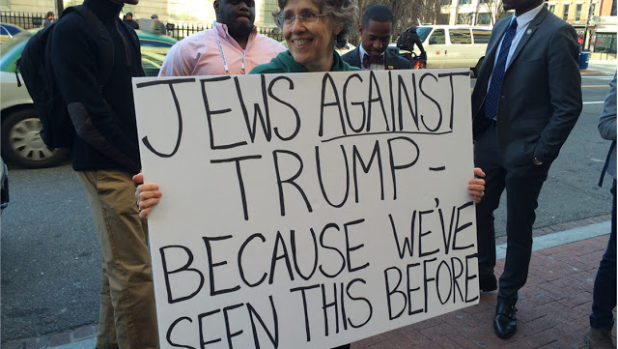Diversity Macht Frei
November 14, 2016
Occasionally, when the question of Jewish support for immigrationism and multiculturalism is raised, someone will dispute it or say the case for the prosecution hasn’t been proved. But look carefully and you will see Jews often boastfully acknowledge these things themselves. Here, for example, is an article from the Israeli newspaper Haaretz, reproduced in the American newspaper Forward.
Whatever differences American Jews may have had with Barack Obama over the Iran nuclear deal and Middle East peace, they’ve never had a president who was more in tune with their Jewish and liberal essence.
Obama was the realization of the American Jewish vision of a multicultural society, a dream come true for a generation of civil rights activists. He promoted and embodied the liberal ideals that American Jews are more attached to than any other religious group in America.
And he was more knowledgeable about American Jewish culture and Yiddishkeit than any previous president, bar none. Even when they disagreed with him, most American Jews, with the exception of the vocal minority that hated his guts, viewed Obama as a mensch.
It is probably no coincidence that during his tenure, American Jews reached a pinnacle of social and cultural acceptance. Being American Jews was hip. It was cool. It was the thing to be. From Jon Stewart to Jerry Seinfeld, from Joe Lieberman to Bernie Sanders, Jews seemed to be more entrenched than ever before in the American mainstream.
…Trump’s triumph has unleashed the pent up resentment against Jews. His reluctance to tackle manifestations of racism and white supremacism among his supporters has energized and empowered it. If he and his advisers don’t take assertive steps soon, anti-Jewish agitators will feel they have a license from the White House to do as they please. They will get bolder, grow stronger, recruit new adherents and increasingly resort to violence: we’ve seen it before.
But even if brazen anti-Semitic incidents are quelled or die down by themselves, there is no denying that Jews have transformed virtually overnight from insiders to outsiders. Not only did they vote overwhelmingly for Hillary Clinton, prominent conservative Jews who could have allayed their concerns are the ones who have distanced themselves from Trump over the course of the campaign and will play no role in his administration.
American Jewish liberals are bound to feel alienated from their own government in way they’ve never felt before. Most of the values, goals and policy objectives of the Trump administration, even if they turn out to be a paler and more palatable version of his campaign rhetoric, are diametrically opposed to those of most American Jews. They support immigration, pluralism, multiculturalism, social reform, government intervention, separation of church and state, gay marriage, abortion rights and on and on. It is easy to see, in fact, why so many of Trump’s radical supporters would view the Jews as their mortal enemies.
He also notes a gulf between diaspora Jews and Jews in Israel. Jews, in possession of their own country, tend to want to keep it. Jews, in possession of someone else’s country, tend to want to give it away.
As Shmuel Rosner rightly points out for the wrong reasons, Trump may ultimately divide Israeli and American Jews. But the reason for that is not limited, as Rosner asserts, to the yet to be proven assumption that American Jews will resent their Israeli counterparts for liking Trump because he is pro-Israel. It is because Trump’s core message, his reactionary, nativist, chauvinistic, anti-foreigner, anti-immigrant and mainly anti-Muslim worldview is shared by far too many, though far from all Israelis, and is embraced by its ruling coalition. And because many Israeli Jews are indifferent to right-wing anti-Semitism and indeed share right-wing disdain toward the liberalism of American Jews.
 Daily Stormer The Most Censored Publication in History
Daily Stormer The Most Censored Publication in History



